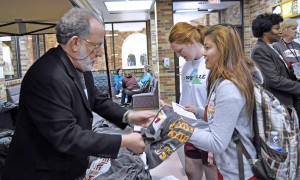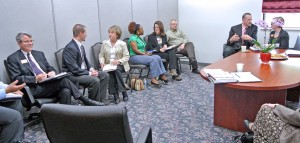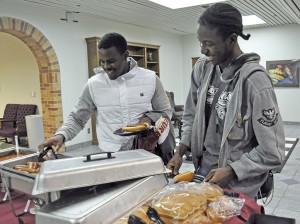Team visits campus in final stages of process

A six-member team representing the Southern Association of Colleges and Schools Commission on Colleges visited campus this week to evaluate the in-depth Quality Enhancement Plan a part of the final stages of an accreditation process that began in 2006.
“It’s been a long, long process, not just the QEP, but the reaffirmation process. Obviously, there’s a certain amount of relief, but we’re all looking forward to the affirmation of our work in the future,” said Robert Clark, vice president of administration and institutional effectiveness as well as SACS liaison.
On campus, in recent weeks, officials focused on completing the QEP, a plan that addressed earlier weaknesses identified by the committee and extending the existing foundations of undergraduate research.
As part of accreditation, SACS requires that schools meet require certain criteria and benchmarks. If MSU does not continue to meet those standards, it runs the risk of losing its accreditation.
If the university is not accredited, the university will lose federal funding and students will not be able to receive loans and grants from the government.
In turn, the job-seeking process for graduating students would become difficult, as most employers do require a bachelor’s degree from an accredited school.
Showcasing undergraduate research through an annual series of highly promoted, funded, and marketed student forums would signal an institutional commitment to student research.
To realize that goal, officials proposed Enhancing Undergraduate Research Endeavors and Creative Activities based on a successful endeavor by the College of Science and Mathematics — the Undergraduate Research Opportunities and Summer Workshop.
“We sent a 385-page re-affirmation document to SACS last September,” he said. “In November, a SACS committee met to go over the document, and if they found any deficiencies, which they did, we draft a focused report addressing those issues.”
Clark also said the QEP is separate from the re-affirmation document, and that it is vital to the campus and will impact student learning because the QEP focuses on undergraduate research.
“I chaired a 16-person committee that wrote the QEP proposal, and then the focused report and QEP were sent to the on-site group that is visiting campus now,” he said. “Their main focus is the QEP and they will be here evaluating the campus until Wednesday, and on Thursday they will submit their findings.”

According to Clark, SACS looked at the QEP report before visiting campus, but team members focused on talking to students and faculty related to undergraduate research, which included speaking to three freshmen about their experiences.
“We want students to engage in learning through research, it’s really a special way to learn. We feel that this can be a transformative process for students,” he said.
Magaly Rincon-Zachary, professor of biology said in just the mere five weeks of UGROW, students who were timid or unsure about their projects, were completely transformed by the end. They felt command over the subject they researched.
“We used UGROW as the model for EURECA, so we’re extending the opportunity to students that can’t research during the summer,” she said.
Rincon-Zachary also said employers know that students involved in research have better critical thinking skills than students who have not had the same experience.
“If two applicants have identical qualifications but one did student research, the employer will definitely notice that,” she said.
The definition of research down not simply mean traditional research in the library, she said. It means creating things and applying knowledge.

According to the QEP Master Plan, undergraduate research is an inquiry or investigation conducted by one or more undergraduate students, with faculty guidance, that attempts to make an intellectual, creative, or applied contribution to one or more disciplines.
“I would like students from all the colleges to apply,” Rincon-Zachary said. “If they don’t get in the first time, try again because there is always an opportunity for everyone.”
As director of undergraduate research, Rincon-Zachary implements EURECA, doing everything from creating the application to helping students with research ideas.
“A group of us evaluate the research applications and we select the most student-focused ones that we can,” she said. “Everything we do is for the students. We look specifically at what the students’ role in the research process will be.”
While the accreditation team was on campus, Clark and Richon-Zachary encouraged students to wear the EURECA shirts, 6,000 which were printed and distributed all over campus, to show their support for student research during the SACS visit.
“[The accreditation process has] generated a great amount of interest in the program. We’ve already received requests from faculty and students,” Clark said. “This has a chance of really snowballing.”
Despite the best efforts of most of the faculty members to educate students about undergraduate research in general and EURECA specifically, some students remained uninformed.
“All I know is that it’s an undergraduate research program,” Dinalee Peterson, junior in mass communication, said. “I’m sure it will have a good impact on students doing research, but probably not for me.”
Other students displayed an immense sense of optimism and believe in the positive impact that EURECA will have on the university.
“We just want to make it better for students by boosting the amount of undergraduate research,” Melody Coffey, Student Government Association vice president and senior in mechanical engineering, said. “UGROW is in the summer, but with EURECA, you can research at any time.”














